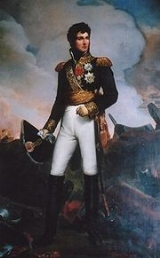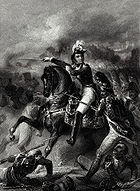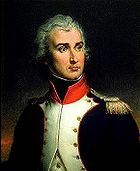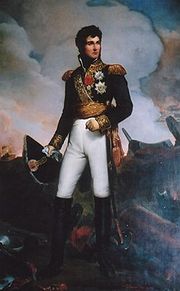
Jean Lannes
Encyclopedia
Jean Lannes, 1st Duc de Montebello
, (10 April 1769 – 31 May 1809) was a Marshal of France
. He was one of Napoleon's most daring and talented generals. Napoleon once commented on Lannes: "I found him a pygmy
and left him a giant
". A personal friend of the emperor, he was allowed to address him as "tu", as opposed to "vous".
, in the Gers
department in the south of France. He was the son of a Gascon farmer, Jeannet Lannes (1733 – 1812, son of Jean Lannes (d. 1746) and wife Jeanne Pomiès (d. 1770) and paternal grandson of Pierre Lane and wife Bernarde Escossio, both died in 1721), and wife Cécile Fouraignan (1741 – 1799), and was apprenticed to a dye
r. He had little education, but his great strength and proficiency in all manly sports caused him in 1792 to be elected sergeant-major of the battalion of volunteers of Gers, which he had joined on the breaking out of war between Spain and the French republic. He served through the campaigns in the Pyrenees in 1793 and 1794, and rose by distinguished conduct to the rank of chef de brigade. However, in 1795, on the reform of the army introduced by the Thermidorians, he was dismissed from his rank.
He married twice, in Perpignan
, 19 March 1795 to Paulette Méric, whom he divorced because of infidelity in 1800, after she had given birth to an illegitimate son while he was campaigning in Egypt:
and secondly at Dornes on 16 September 1800 to Louise Antoinette, Comtesse de Guéhéneuc
(Paris, 26 February 1782 – Paris, 3 July 1856), by whom he had five children:
one who succeeded in his titles and three others who used the courtesy title of Baron. One of his direct descendants, Philippe Lannes de Montebello
, was until 2008 the director of the Metropolitan Museum of Art
.
while aiding Bonaparte to escape the Austrian advance. He was chosen by Bonaparte to accompany him to Egypt
as commander in one of Kléber's brigades, in which capacity he greatly distinguished himself, especially on the retreat from Syria. He was wounded at the Battle of Aboukir. He went back to France with Bonaparte, and assisted him in his 1799 coup
. After Bonaparte's take over and appointment as Consul of France, Lannes was promoted to the ranks of general of division and commandant of the consular guard. Back with the Armée d'Italie, Lannes commanded the advanced guard in the crossing of the Alps
in 1800, was instrumental in winning the Battle of Montebello
, from which he afterwards took his title, and bore the brunt of the Battle of Marengo.

, near Paris, in 1804 and had one of its state apartments redecorated for a visit from Napoleon.
On the establishment of the empire he was created a Marshal of France
(1804), and commanded once more the advanced guard of a great French army in the campaign of Austerlitz
. At Austerlitz he had the left of the Grande Armée. In the 1806-07 campaign he was at his best, commanding his corps with the greatest credit in the march through the Thuringia
n Forest, the action of Saalfeld
(which is studied as a model today at the French Staff College) and the Battle of Jena. His leadership of the advanced guard at Friedland
was even more prominent.
After this, Lannes was to be tested as a commander-in-chief, for Napoleon took him to Spain in 1808, and gave him a detached wing of the army, with which he won a victory over Castaños
at Tudela
on 22 November. In January 1809 he was sent to attempt the capture of Saragossa
, and by 21 February, after one of the most stubborn defences in history, was in possession of the place. He said " this damned Bonaparte is going to get us all killed" after his last campaign in Spain. Napoleon then in 1808 created him Duc de Montebello, and in 1809, for the last time, gave him command of the advanced guard. He took part in the engagements around Eckmühl and the advance on Vienna. With his corps he led the French army across the Danube
, and bore the brunt, with Masséna
, of the terrible battle of Aspern-Essling
. On 22 May he received a mortal wound. His eldest son was made a peer of France by Louis XVIII
.

, Marshal Lannes went and sat down at the edge of a ditch, his hand over his eyes and his legs crossed. As he sat there, plunged in gloomy meditation, a small three-pound shot, fired from a gun at Enzersdorf
, ricochetted, and struck him just where his legs crossed. The knee-pan of one was smashed, and the back sinews of the other torn. The Marshal said, "I am wounded; it's nothing much; give me your hand to help me up." He tried to rise, but could not. He was carried to the tête de port, where the chief surgeons proceeded to dress his wound. One of the marshal's legs was amputated. He bore the operation with great courage; it was hardly over when Napoleon came up and, kneeling beside the stretcher, wept as he embraced the marshal. Lannes' other leg was later also amputated. On 23 May he was transported by boat to the finest house in Kaiserebersdorf. Eight days later he succumbed to his wounds at daybreak on 30 May.
 Lannes ranks with Louis Nicolas Davout
Lannes ranks with Louis Nicolas Davout
and André Masséna
as the ablest of all of Napoleon's marshals. He was continually employed in tasks requiring the utmost resolution and daring, and more especially when the emperor's combinations depended upon the vigour and self-sacrifice of a detachment or fraction of the army. It was thus with Lannes at Friedland and at Aspern as it was with Davout at Austerlitz and Auerstädt, and Napoleon's estimate of his subordinates' capacities can almost exactly be judged by the frequency with which he used them to prepare the way for his own shattering blow. Routine generals with the usual military virtue, or careful and exact troop leaders like Soult and Macdonald, Napoleon kept under his own hand for the final assault which he himself launched, but the long hours of preparatory fighting against odds of two to one, which alone made the final blow possible, he entrusted only to men of extraordinary courage and high capacity for command. In his own words, he found Lannes a pygmy, and left him a giant. Lannes's place in his affections was never filled.
Montebello della Battaglia
Montebello della Battaglia is a comune in the Province of Pavia in the Italian region Lombardy, located about 50 km south of Milan and about 20 km south of Pavia....
, (10 April 1769 – 31 May 1809) was a Marshal of France
Marshal of France
The Marshal of France is a military distinction in contemporary France, not a military rank. It is granted to generals for exceptional achievements...
. He was one of Napoleon's most daring and talented generals. Napoleon once commented on Lannes: "I found him a pygmy
Pygmy
Pygmy is a term used for various ethnic groups worldwide whose average height is unusually short; anthropologists define pygmy as any group whose adult men grow to less than 150 cm in average height. A member of a slightly taller group is termed "pygmoid." The best known pygmies are the Aka,...
and left him a giant
Giant (mythology)
The mythology and legends of many different cultures include monsters of human appearance but prodigious size and strength. "Giant" is the English word commonly used for such beings, derived from one of the most famed examples: the gigantes of Greek mythology.In various Indo-European mythologies,...
". A personal friend of the emperor, he was allowed to address him as "tu", as opposed to "vous".
Early life
Lannes was born in the small town of LectoureLectoure
Lectoure is a commune in the Gers department in the Midi-Pyrénées in southwestern France.It is located north of Auch, the capital of the department, south of Agen and approximately northwest of Toulouse.-History:...
, in the Gers
Gers
The Gers is a department in the Midi-Pyrénées region in the southwest of France named after the Gers River.Inhabitants are called les Gersois or Gersoises.-History:...
department in the south of France. He was the son of a Gascon farmer, Jeannet Lannes (1733 – 1812, son of Jean Lannes (d. 1746) and wife Jeanne Pomiès (d. 1770) and paternal grandson of Pierre Lane and wife Bernarde Escossio, both died in 1721), and wife Cécile Fouraignan (1741 – 1799), and was apprenticed to a dye
Dye
A dye is a colored substance that has an affinity to the substrate to which it is being applied. The dye is generally applied in an aqueous solution, and requires a mordant to improve the fastness of the dye on the fiber....
r. He had little education, but his great strength and proficiency in all manly sports caused him in 1792 to be elected sergeant-major of the battalion of volunteers of Gers, which he had joined on the breaking out of war between Spain and the French republic. He served through the campaigns in the Pyrenees in 1793 and 1794, and rose by distinguished conduct to the rank of chef de brigade. However, in 1795, on the reform of the army introduced by the Thermidorians, he was dismissed from his rank.
He married twice, in Perpignan
Perpignan
-Sport:Perpignan is a rugby stronghold: their rugby union side, USA Perpignan, is a regular competitor in the Heineken Cup and seven times champion of the Top 14 , while their rugby league side plays in the engage Super League under the name Catalans Dragons.-Culture:Since 2004, every year in the...
, 19 March 1795 to Paulette Méric, whom he divorced because of infidelity in 1800, after she had given birth to an illegitimate son while he was campaigning in Egypt:
- Jean-Claude Lannes de Montebello (MontaubanMontaubanMontauban is a commune in the Tarn-et-Garonne department in the Midi-Pyrénées region in southern France. It is the capital of the department and lies north of Toulouse....
, 12 February 1799 – 1817), who died unmarried and without issue,
and secondly at Dornes on 16 September 1800 to Louise Antoinette, Comtesse de Guéhéneuc
Louise Antoinette Lannes, Duchess of Montebello
Louise Antoinette Lannes, Duchess of Montebello was the daughter of senator and financier François Scholastique, Count of Guéhéneuc. She was the sister of general Charles Louis Joseph Olivier, Count of Guéhéneuc.On September 16, 1800, age 18 at Dornes she married general Jean Lannes , being his...
(Paris, 26 February 1782 – Paris, 3 July 1856), by whom he had five children:
- Louis Napoléon (30 July 1801 – 19 July 1874)
- Alfred-Jean (11 July 1802 – 20 June 1861)
- Jean-Ernest (20 July 1803 – 24 November 1882)
- Gustave-Olivier (4 December 1804 – 25 August 1875)
- Josephine-Louise (4 March 1806 – 8 November 1889)
one who succeeded in his titles and three others who used the courtesy title of Baron. One of his direct descendants, Philippe Lannes de Montebello
Philippe de Montebello
Philippe de Montebello served from 1977 to 2008 as the director of the Metropolitan Museum of Art in New York. On his retirement, he was both the longest-serving director in the institution's history, and the longest-serving director of any major art museum in the world...
, was until 2008 the director of the Metropolitan Museum of Art
Metropolitan Museum of Art
The Metropolitan Museum of Art is a renowned art museum in New York City. Its permanent collection contains more than two million works, divided into nineteen curatorial departments. The main building, located on the eastern edge of Central Park along Manhattan's Museum Mile, is one of the...
.
Campaigns of Italy and Egypt
He re-enlisted as a simple volunteer in the French Armée d'Italie, and in its campaign of 1796, he again fought his way up to high rank, being eventually made a general of brigade by orders of Bonaparte. He was distinguished in every battle, and was wounded in the Battle of the Bridge of ArcoleBattle of the Bridge of Arcole
The Battle of Arcole, or Battle of Arcola saw a bold manœuvre by Napoleon Bonaparte's French Army of Italy to outflank the Austrian army under József Alvinczi and cut its line of retreat...
while aiding Bonaparte to escape the Austrian advance. He was chosen by Bonaparte to accompany him to Egypt
Egypt
Egypt , officially the Arab Republic of Egypt, Arabic: , is a country mainly in North Africa, with the Sinai Peninsula forming a land bridge in Southwest Asia. Egypt is thus a transcontinental country, and a major power in Africa, the Mediterranean Basin, the Middle East and the Muslim world...
as commander in one of Kléber's brigades, in which capacity he greatly distinguished himself, especially on the retreat from Syria. He was wounded at the Battle of Aboukir. He went back to France with Bonaparte, and assisted him in his 1799 coup
18 Brumaire
The coup of 18 Brumaire was the coup d'état by which General Napoleon Bonaparte overthrew the French Directory, replacing it with the French Consulate...
. After Bonaparte's take over and appointment as Consul of France, Lannes was promoted to the ranks of general of division and commandant of the consular guard. Back with the Armée d'Italie, Lannes commanded the advanced guard in the crossing of the Alps
Alps
The Alps is one of the great mountain range systems of Europe, stretching from Austria and Slovenia in the east through Italy, Switzerland, Liechtenstein and Germany to France in the west....
in 1800, was instrumental in winning the Battle of Montebello
Battle of Montebello (1800)
The Battle of Montebello was fought on 9 June 1800 near Montebello in Lombardy. During the lead-up to the Battle of Marengo, the vanguard of the French army in Italy engaged and defeated an Austrian force in a "glorious victory".-Background:...
, from which he afterwards took his title, and bore the brunt of the Battle of Marengo.

Service to the Empire
In 1801 Napoleon sent him as ambassador to Portugal. Opinions differ as to his merits in this capacity; Napoleon never made such use of him again. Lannes purchased the seventeenth-century Château de MaisonsChâteau de Maisons
The Château de Maisons , designed by François Mansart from 1630 to 1651, is a prime example of French baroque architecture and a reference point in the history of French architecture...
, near Paris, in 1804 and had one of its state apartments redecorated for a visit from Napoleon.
On the establishment of the empire he was created a Marshal of France
Marshal of France
The Marshal of France is a military distinction in contemporary France, not a military rank. It is granted to generals for exceptional achievements...
(1804), and commanded once more the advanced guard of a great French army in the campaign of Austerlitz
Battle of Austerlitz
The Battle of Austerlitz, also known as the Battle of the Three Emperors, was one of Napoleon's greatest victories, where the French Empire effectively crushed the Third Coalition...
. At Austerlitz he had the left of the Grande Armée. In the 1806-07 campaign he was at his best, commanding his corps with the greatest credit in the march through the Thuringia
Thuringia
The Free State of Thuringia is a state of Germany, located in the central part of the country.It has an area of and 2.29 million inhabitants, making it the sixth smallest by area and the fifth smallest by population of Germany's sixteen states....
n Forest, the action of Saalfeld
Battle of Saalfeld
The Battle of Saalfeld saw Marshal Lannes and a division of his V Corps defeat 8,300 Prussians under Prince Louis Ferdinand.-Battle:Prince Louis Ferdinand was one of the principal advocates of resuming war against the French....
(which is studied as a model today at the French Staff College) and the Battle of Jena. His leadership of the advanced guard at Friedland
Battle of Friedland
The Battle of Friedland saw Napoleon I's French army decisively defeat Count von Bennigsen's Russian army about twenty-seven miles southeast of Königsberg...
was even more prominent.
After this, Lannes was to be tested as a commander-in-chief, for Napoleon took him to Spain in 1808, and gave him a detached wing of the army, with which he won a victory over Castaños
Francisco Javier Castaños, 1st Duke of Bailén
Francisco Javier Castaños Aragorri Urioste y Olavide, Count of Castaños y Aragones, 1st Duke of Baylen , was a Spanish general.Castaños was born at Madrid.He is remembered for his victory over the French under Dupont, whom he...
at Tudela
Battle of Tudela
The Battle of Tudela was a battle of the Peninsular War fought on November 23, 1808 near Tudela, Spain. The battle resulted in the victory of the French and Poles under Marshal Lannes against the Spanish under General Castaños....
on 22 November. In January 1809 he was sent to attempt the capture of Saragossa
Siege of Saragossa (1809)
The Second Siege of Saragossa was the French capture of the Spanish city of Zaragoza during the Peninsular War.It is particularly noted for its brutality.-Prelude:...
, and by 21 February, after one of the most stubborn defences in history, was in possession of the place. He said " this damned Bonaparte is going to get us all killed" after his last campaign in Spain. Napoleon then in 1808 created him Duc de Montebello, and in 1809, for the last time, gave him command of the advanced guard. He took part in the engagements around Eckmühl and the advance on Vienna. With his corps he led the French army across the Danube
Danube
The Danube is a river in the Central Europe and the Europe's second longest river after the Volga. It is classified as an international waterway....
, and bore the brunt, with Masséna
André Masséna
André Masséna 1st Duc de Rivoli, 1st Prince d'Essling was a French military commander during the Revolutionary and Napoleonic Wars....
, of the terrible battle of Aspern-Essling
Battle of Aspern-Essling
In the Battle of Aspern-Essling , Napoleon attempted a forced crossing of the Danube near Vienna, but the French and their allies were driven back by the Austrians under Archduke Charles...
. On 22 May he received a mortal wound. His eldest son was made a peer of France by Louis XVIII
Louis XVIII of France
Louis XVIII , known as "the Unavoidable", was King of France and of Navarre from 1814 to 1824, omitting the Hundred Days in 1815...
.

Death
On 22 May, during a lull in the second day of the Battle of Aspern-EsslingBattle of Aspern-Essling
In the Battle of Aspern-Essling , Napoleon attempted a forced crossing of the Danube near Vienna, but the French and their allies were driven back by the Austrians under Archduke Charles...
, Marshal Lannes went and sat down at the edge of a ditch, his hand over his eyes and his legs crossed. As he sat there, plunged in gloomy meditation, a small three-pound shot, fired from a gun at Enzersdorf
Groß-Enzersdorf
Groß-Enzersdorf is a town and municipality in the district of Gänserndorf in the Austrian state of Lower Austria, directly to the east of Vienna and north of the river Danube...
, ricochetted, and struck him just where his legs crossed. The knee-pan of one was smashed, and the back sinews of the other torn. The Marshal said, "I am wounded; it's nothing much; give me your hand to help me up." He tried to rise, but could not. He was carried to the tête de port, where the chief surgeons proceeded to dress his wound. One of the marshal's legs was amputated. He bore the operation with great courage; it was hardly over when Napoleon came up and, kneeling beside the stretcher, wept as he embraced the marshal. Lannes' other leg was later also amputated. On 23 May he was transported by boat to the finest house in Kaiserebersdorf. Eight days later he succumbed to his wounds at daybreak on 30 May.
Assessment

Louis Nicolas Davout
Louis-Nicolas d'Avout , better known as Davout, 1st Duke of Auerstaedt, 1st Prince of Eckmühl, was a Marshal of France during the Napoleonic Era. His prodigious talent for war along with his reputation as a stern disciplinarian, earned him the title "The Iron Marshal"...
and André Masséna
André Masséna
André Masséna 1st Duc de Rivoli, 1st Prince d'Essling was a French military commander during the Revolutionary and Napoleonic Wars....
as the ablest of all of Napoleon's marshals. He was continually employed in tasks requiring the utmost resolution and daring, and more especially when the emperor's combinations depended upon the vigour and self-sacrifice of a detachment or fraction of the army. It was thus with Lannes at Friedland and at Aspern as it was with Davout at Austerlitz and Auerstädt, and Napoleon's estimate of his subordinates' capacities can almost exactly be judged by the frequency with which he used them to prepare the way for his own shattering blow. Routine generals with the usual military virtue, or careful and exact troop leaders like Soult and Macdonald, Napoleon kept under his own hand for the final assault which he himself launched, but the long hours of preparatory fighting against odds of two to one, which alone made the final blow possible, he entrusted only to men of extraordinary courage and high capacity for command. In his own words, he found Lannes a pygmy, and left him a giant. Lannes's place in his affections was never filled.

